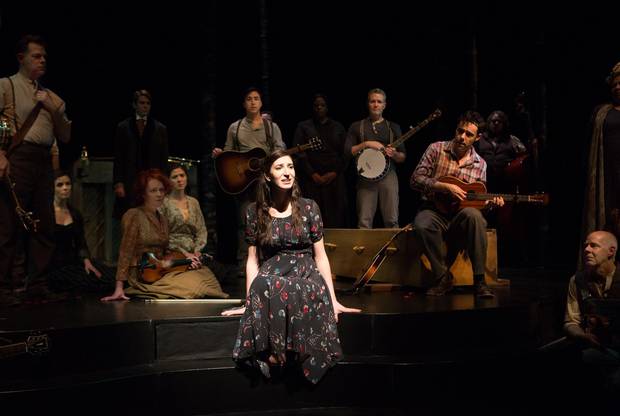How can we make every year into a sesquicentennial for Canadian theatre artists abroad?
While the Canada 150 festivities at home were dominated by debates over colonialism and giant ducks this summer, theatre companies both large and small took advantage of the spotlight and rare extra resources to bring our plays and musicals to the biggest performing-arts marketplaces in the world – and, amid tremendous competition for attention, wowed critics, packed houses and developed new international relationships that will pay off for years to come.
It's worth taking a look over the shoulder at what happened in New York and Edinburgh – to see whether these striking successes might be repeatable in Canada 151, 152, 153 …
First, in July, Soulpepper – the biggest not-for-profit theatre in Toronto – took over a theatre complex off-Broadway for a month to celebrate Canada 150, bringing with it a dozen of its most popular productions of new work and adaptations.
In one of the most theatre-saturated cities in the English-speaking world, the $2.5-million residency managed to cut through the noise and impress the critics – with The New York Times selecting both the musical Spoon River and Vern Thiessen's adaptation of W. Somerset Maugham's Of Human Bondage as "critics' picks."
Crowds followed and so did many influential artistic directors – with the repertory theatre company overshooting their box office goal.
"Right now, we're not trying to figure out [whether] we are going back, but when can we go back," says Albert Schultz, Soulpepper's artistic director, who adds the trip has sparked "10 good conversations" with American commercial and not-for-profit producers, such as the New York Theatre Workshop, that may lead to future projects.
Soulpepper took over a theatre complex off-Broadway for a month to celebrate Canada 150, bringing with it several productions, including Spoon River.
Cylla von Tiedemann
Next, in August, Michael Rubenfeld – a former artistic director of Toronto's SummerWorks festival – set up a venue called CanadaHub at the Edinburgh Festival to specifically showcase work from some of the country's independent performance companies.
While Canadian artists regularly travel to present work at Edinburgh, which with close to 3,500 shows in 300 venues has been called the biggest cultural festival in the world, the pooling of publicity and production resources paid off big time.
Of the six projects CanadaHub presented, three became major hits, won awards – and will now be travelling around the world.
Mouthpiece, for instance, the impressive feminist two-hander from Norah Sadava and Amy Nostbakken's Quote Unquote Collective, is currently cementing substantial tours in Britain and the United States. In London alone, three theatre companies are competing to present the physically and vocally inventive show about a woman struggling to writing a eulogy for her mother.
Meanwhile, Old Stock: A Refugee Love Story, a 2b theatre production created by playwright Hannah Moscovitch with the klezmer-folk musician Ben Caplan and director Christian Barry, did even better.
Menno Plukker, the theatre agent who represents 2b theatre, is now busy plotting an international tour for the dark, musical folk tale inspired by the real story of Moscovitch's great-grandparents. It will kick off in March with a seven-week run at a major off-Broadway theatre – afterward, the show is booked around the world (including stops in Toronto, Montreal and Vancouver) until the summer of 2019.
"It's quite sensational even for me after 25 years in the field," says Plukker, whose roster includes the country's biggest international stars, such as director Robert Lepage and choreographer Crystal Pite. "Hardly have I ever seen such a success."
That Old Stock looks set to become Moscovitch's most-seen show internationally – after a decade of winning awards and building an audience at home, but never really breaking out beyond Canada's border – gives you an idea of how important taking theatre out of the country is to selling it to the world.

Soulpepper is in a happy quandary, figuring out whether and how it might make international touring a part of its annual operations rather than a one-off.
Cylla von Tiedemann
Try as you might, it's difficult to get international producers to come in significant numbers to Canada for a single regular-season show or two at a company such as Soulpepper. (Plukker says it might have to do with the country's exaggerated reputation for cold winters.)
And while festivals such as PuSh in Vancouver and Festival TransAmériques in Montreal do attract presenters by offering the opportunity to see multiple shows in a single visit, they don't have the critical mass that you'll find in Edinburgh in August or New York.
When Rubenfeld ran SummerWorks in Toronto, he would "stand on his head" to get even six presenters to visit; in Edinburgh, he estimates over 400 presenters walked through the doors of CanadaHub.
How can we build our theatrical exports going forward? CanadaHub is a great resource for smaller companies – and could easily become permanent. Rubenfeld estimates it cost about $500,000 to run – with the Canada Council for the Arts the major funding partner and the High Commission of Canada in Britain kicking in as well due to the sesquicentennial. He's now hopeful that the council, having seen the success this year, will commit to long-term support.
Meanwhile, Soulpepper is in a happy quandary, figuring out whether and how it might make international touring a part of its annual operations rather than a one-off now that it has relationships beyond our borders. "Do you have to grow the company to do this more is something that I think we do have to think about," Schultz says. "It will take at least a year to figure out what the next steps are."
It would be helpful if some of the federal support for the exportation of culture that disappeared during the decade the Conservatives were in power were to return – perhaps in new or improved (and ideally arm's-length) forms. PromArt, a $4.7-million Department of Foreign Affairs and International Trade program, and Trade Routes, a $9-million program at the Department of Canadian Heritage that helped facilitate the exportation of culture, were cut, while cultural attachés at embassies and consulates were the victims of shrinking budget.
But another barrier to touring has been mental rather than financial – a feeling of "lesser than" that can still affect Canadian theatre. Hopefully, the successes of this sesquicentennial year – which also include Come From Away's profitable run on Broadway and Kidd Pivot and Electric Theatre Company's Olivier Award for Betroffenheit – will help erase that and convince more artists to take the risk of going abroad.
Schultz says even some of the veteran artists with long careers in Canada in his company felt bolstered by the positive reception they received in New York.
"To have people there say it's great … somehow it seems wrong to even have to say this, but there's a kind of validation that happens," he says. "It's not your hometown team saying, 'Yes, we love our own' – it's complete strangers."
